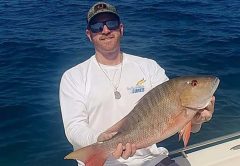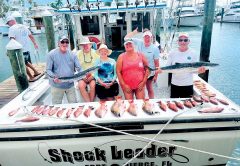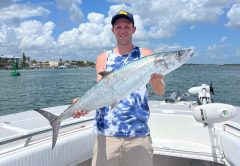
[dropcap]S[/dropcap]pring typically marks the beginning of frequent southerly trade winds for our area. These winds are my favorite! Southerly winds are consistent, warm and somewhat easy to predict. The nature of the direction also means the wind will be side or side on to the beach. For you non-sailors, this means the wind will be coming straight down the beach or at a slight angle towards the beach. This direction is perfect for kiting as it allows for an easy tack to and from the beach. This wind direction also allows for great opportunities to ride downwind for miles and miles enjoying the warm southerly wind and the crystal blue water it brings with it. When it comes to kiteboarding, most would agree that these “downwinders” are a highlight of the sport. Whether you plan to go half a mile or thirty, careful planning can help keep it fun and preserve access for our sport.

Location is obviously one of the first considerations. You have to think about every obstacle you may come across during your journey. For example, a pier, a reef, large breaking waves, swim zones (guarded areas), rocky beaches and so forth. You have to have an exit strategy for each one of these things. As you never know when the wind may die out or when you may have an equipment failure. Never blindly attempt a downwinder. You should ask local knowledge and physically examine the entire coastline you plan to ride. Once I rescued an individual two miles off the coast who had ridden beyond his rendezvous point. He did not pay attention to the curvature in the coast and had gone so far downwind that the wind was now blowing offshore (from land to sea). This made it impossible for him to return and fortunately we saw him in the distance and we were able to acquire a small boat and go get him. The point being, you have to think of everything on these downwind adventures down to the curvature of the land.
“[dropcap]K[/dropcap]iteboarding downwind gives kiteboarders the freedom to ride anywhere from half a mile to record breaking thousand mile journeys.”
Bring extra safety equipment! Of course a PFD is always a good idea. But some extras would include a small marine radio or waterproof cellphone and cash for a cab in case you don’t make it all the way downwind to your awaiting vehicle. Always let someone know where you are headed, what you are flying, wearing, and your estimated timeline. If you do get stuck adrift, you will be glad you did. Another good rule of thumb is not to go any further offshore than you know you can swim; you may have to!
One thing to be especially careful of, is not to ride through guarded beaches/swim areas. Make sure to follow the rules of normal water craft. You need to stay beyond the swim boundary markers and know where they are. Do not fly your kite over fellow beach goers and stay a good distance from surfers and swimmers. Not only does this help preserve access but it’s just good common courtesy. Also keep in mind, people who do not understand the sport may perceive certain things as unsafe even though we know they are safe. For example, riding closely downwind from a surfer or swimmer. We know as kiters that there is no way we could possibly endanger them due to the physics of the sport. However, to the untrained eye, it may look like you are endangering that person. So keep things like this in mind during your kiting excursions.
Alright, now that we have discussed the basic safety protocols, here is a little secret about predicting south wind for your next adventure. South wind often blows even when it’s not supposed to. In order to predict this non-forecasted event, look for the following, light to medium morning winds blowing from the south-southeast, south or south-southwest direction, temperatures reaching at least 5-to-10 degrees higher than the sea surface temperature, small flat bottom clouds over land and perfectly clear sky over the ocean. When you see these things, the chances of a strong afternoon southerly breeze is very high, even when it is not forecasted.
I hope this article gives you some great insight on the awaiting spring adventures kiteboarding has to offer. As always, never kite alone, make sure to take proper training and know your limits. If you would like to receive some training or join us on one of our downwind adventures, please contact me through NewWaveKiteboarding.com
[easy-social-share]




